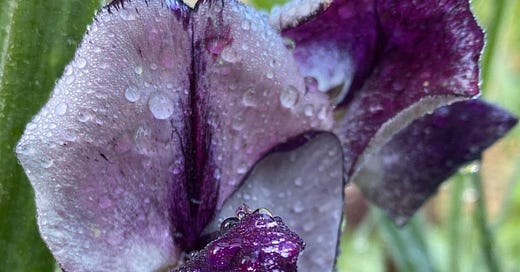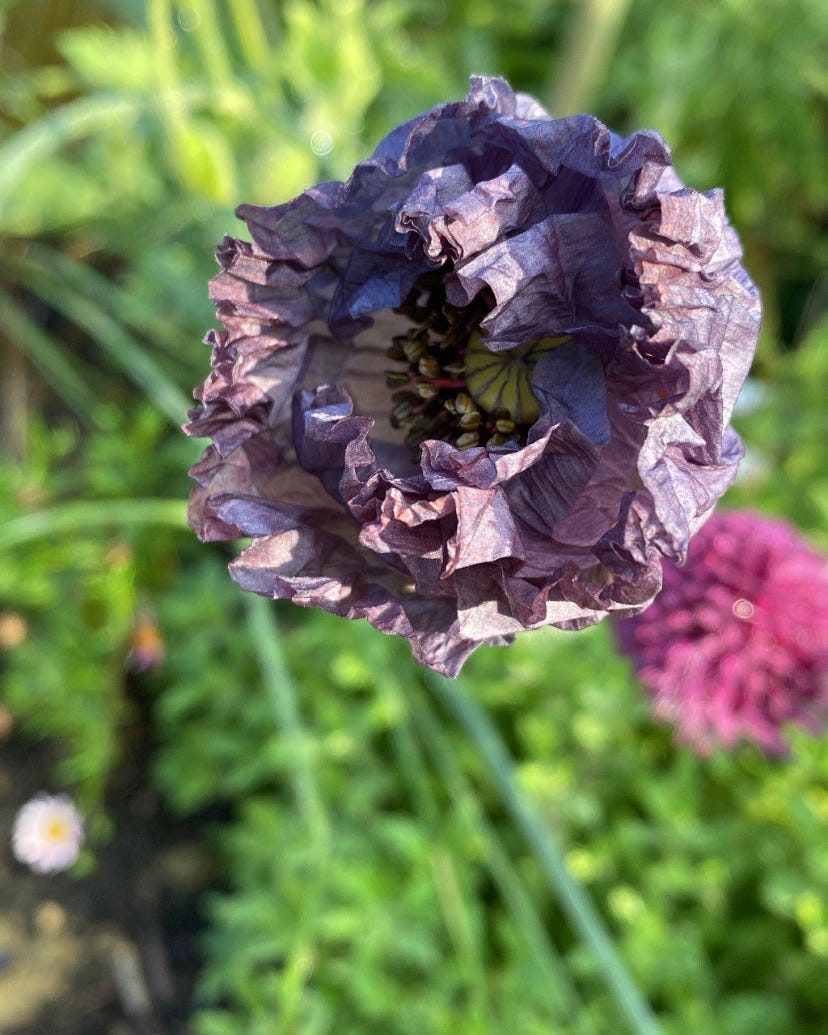But first, briefly…
Hello, and welcome to new subscribers. These are my occasional musings on the state of my internal and external landscapes, as I try to make sense of being a human animal living in these times. Usually they come roughly every six weeks, around the marker points of the Celtic wheel of the year, a cycle that intrigues me, but currently they are a little more frequent in the build up to the release of my first book, Uprooting, a culmination of many of the thoughts that first took form here.
If you enjoy these thoughts, offered as a gift to a troubled world, please consider supporting my writing by preordering a copy of my book from your favourite local bookseller if you can. It will be released in just under two weeks’ time, on August 3rd, and preorders can have a significant impact on the overall life of a book. Or if not, do consider requesting it from your local library – I am a librarian’s daughter, and nothing would please me more.
I will be doing a host of talks and events this summer about the ideas I write about, and I’m really delighted by all of them. A regularly updated list is on my website, but the next few are:
A conversation on the Colonial Countryside at Primadonna Festival in Stowmarket, on Friday 28th July, with Professor Corinne Fowler (author of Green Unpleasant Land, which has influenced my thinking so much), Mahsuda Snaith and Winnie Li.
Uprooting’s launch into the world on Thursday 3rd August in my home city of Bath, with the amazing Rebecca Schiller, at the wonderful, generous, enthusiastically welcoming Toppings & Co. It’s going to be a party, so do come along if you can!
The party continues at Wilderness Festival, where I will be in conversation on Sunday 6th August with Alice Vincent, author of Why Women Grow, a beautiful book that examines different women’s stories of what brings them to the land, and mine happens to be one of them.
I have linked to the events so that you can find out more and get tickets if you are in the vicinity. It would be delightful to see you there! But for now, onto the things my garden has told me this week…
I stare at the news app on my phone trying to make sense of things. A heatwave harming crops, scientists sounding the alert about the crisis in food security next to an article about how our government is reneging on its climate pledges. Seats won and lost in an election like points scored in a game, one where care for our climate – care for all of us who depend on a liveable planet – is always the loser. Consultants on strike remarkably do not make the news, although I know too well how it is hurting them to take this action, to try to bring attention to the crisis in the funding of care that their patients desperately need. No one will attend to it. Carelessly in its place, an article about the royal’s family hidden increase in funding, a 45% rise in taxpayer funding, in the midst of a cost of living crisis where the value of most people’s pay has fallen catastrophically.
So many crises. They spiral round my brain until they merge into one, consolidated thought that circles over and over in my mind. That at their root, all our many crises are a crisis of unbelonging. Our physical health crisis because we do not know how to belong to our bodies, a mental health crisis because we do not know how to belong to one another, a climate crisis as we no longer know how to belong to this earth, our only home. We are lost in our unbelonging and the earth burns with grief for the loss of us.
A moment’s clarity, but then it is gone. Trying to make sense of the senseless headlines is maddening. We are in a collective psychosis. One of our minds’ key skills that allows us to function as a species is the ability to symbolise, to allow one thing to hold value in the place of another. This is how we dream, how we create. This is how we trade. It is thought that money was originally a symbol, holding value for the exchange of other goods and services that are truly essential to our thriving. Now money has lost its symbolic purpose, has been collapsed into the thing of value itself, the thing that all these senseless headlines refer to in one capacity or another – too much hoarded in one place, not enough available elsewhere. Our psyches have collapsed with it.
I take my collapsed mind into the garden, where I have been thinking for a while about my urge to grow flowers. To grow beauty, and scent, shape, colour, and form, to have as many flowers around me at any one time as I can possibly coax from the earth. It has felt trivial, useless, selfish even to focus on growing beauty in these times. In these treacherous times for the growing and supply of food. Until it occurred to me in the course of recent fertile conversation that I am growing food, and not just in my limited veg beds. I am growing huge quantities of it. Food for creatures other then myself. Other than the solely human.
This summer my garden has been dense with insect life. They crowd the air, flutter around our heads, dance backlit in the garden’s golden light. They get into our noses and mouths, make us splutter with them. They crawl into beds and clothes, shoes and pockets. They glow beside the paths at dusk.
In a time when the garden begins to lose its solace; when to be in the garden is to be disconcerted by the undeniable presence of climate change, when spending time among the plants is to be distressed by the unpredictable variability that makes the growing of annual veg on which our food systems rely precarious and uncertain. In this time when to look honestly at the earth is to feel pain, the generous clouds and drifts of insects over this garden’s soil this summer comforts me. Their strengthening numbers here, year on year, feels like the garden’s joyous response to our presence. An ecstatic yes uttered in response to our caress upon her skin.
Every year I plant more perennial edible plants in the garden. The way that we think about food, the way that we think about the work of food, the way that we think about work, will need to change. I think constantly about our ideas of lives past, statements that to ‘go back’ to anything like lives that were led before would be an inevitable regression into hardship, dirt, illness, poverty and suffering. I think about the oft-stated belief that increased reliance on technology, just somehow better technology, will save us. Perhaps. But I remember the impression of a certain Christopher who changed the shape of the world when he encountered some ancestors of mine in their so-called primitive homes a few hundred years ago. How lazy they were described, how little work they seemed to need to do, how abundant their food seemed, how their lives looked like paradise. I think about the way time is a spiral – there is no linear path forwards, things unaddressed will circle round to meet us again, whether we want them to or not.
These thoughts and the questions they spawn spiral above my head, a psychic tornado. I have no answers, I will be lost in the updraft. I know only to ground myself, to plant my hands firmly into the earth, where my fingers grow into hyphae, stretch into roots, rise as stems, spawn flowers, flowers, flowers, consumed by so many, as the garden consumes me.





Thank you for sharing this! It's so affirming to hear people who are struggling with and rejoicing in the same things as me
Beautiful words for dizzying and daring thoughts which inspire and uplift my own presence in the garden and the world. Thank you, Ahava